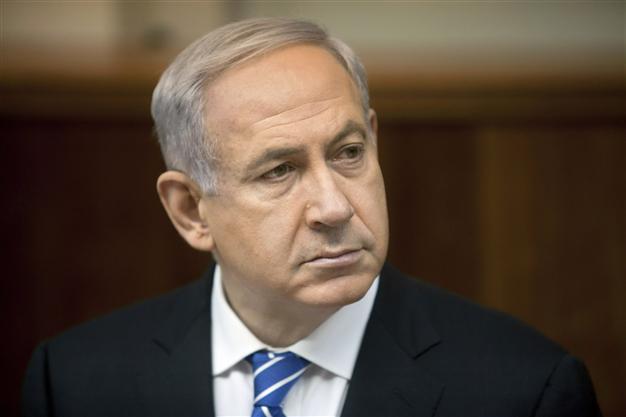Israel PM in final throes of forming coalition
JERUSALEM - Agence France-Presse

Israel's Prime Minister Benjamin Netanyahu attends the weekly cabinet meeting in Jerusalem March 10, 2013. REUTERS Photo
Israeli Prime Minister Benjamin Netanyahu on Sunday entered the final stretch of talks to form a new coalition government which will be sworn in just days before a visit by US President Barack Obama.
Time is of the essence for the Israeli leader who is facing a final deadline of March 16 to announce the shape of his new government after receiving a two-week extension to the initial 28 days he was given.
If he fails to piece together a working majority of at least 61 MPs, the task will be handed to another party leader.
He has also been under the additional pressure of preparing for a long-awaited visit by Obama, who will arrive on March 20 for a three-day trip visit to Israel and the Palestinian territories -- his first since becoming president.
Protocol dictates that Netanyahu inform President Shimon Peres when he has succeeded in forming a government, after which the new coalition must be approved by the parliament, or Knesset, and sworn in.
Israeli media suggested the government could be in place as early as Tuesday, but it was not clear whether the procedure would be delayed as Peres is wrapping up a week-long tour of Europe from which he will only return on Wednesday.
"It's clear that at this stage, we are in the midst of an irreversible process," said former foreign minister Avigdor Lieberman, who was involved in the negotiations. "There is no doubt that there will be a government this week." With the deadline looming, Netanyahu has in recent days stepped up the pace of negotiations which began five weeks ago, and after much hesitation, reportedly agreed to work with Yair Lapid's centrist Yesh Atid and Naftali Bennett's far-right Jewish Home party.
Lapid's faction, which was only set up in April 2012, won a shock victory in the January election, taking 19 of the Knesset's 120 seats, while Bennett's Jewish Home swept into fourth place with 12, with both agreeing they would not enter the coalition without the other.
Former foreign minister Tzipi Livni, head of the centrist HaTnuah (six seats), has already agreed to join the coalition and take on the role of justice minister as well as playing a key role in a ministerial team in charge of peace talks.
Netanyahu is also expected to bring in centrist party Kadima (two seats) to join a government headed by his Likud-Beitenu, which combines his rightwing Likud with the hardline Yisrael Beitenu of Lieberman.
Likud-Beitenu's poor election showing, which saw it shedding a quarter of its 42 seats to win a narrow victory with just 31, has forced an unwelcome change on Netanyahu who spent the past four years in a comfortable rightwing-religious coalition.
But the pact between Lapid and Bennett has forced Netanyahu to give up on his so-called "natural partners" -- the ultra-Orthodox Shas and United Torah Judaism -- with Yesh Atid and Jewish Home bent on changing the draft law to compel more ultra-Orthodox men to serve in the army.
"Netanyahu has found it hard to part from the all-too comfortable coalition," the Maariv daily said. "Today he is heading for the unknown." As for the division of ministerial portfolios, media reports were unanimous that Likud's Moshe Yaalon would take the defence ministry, while Netanyahu would temporarily hold on to foreign affairs while Lieberman is on trial for alleged fraud and breach of trust.
Lapid, a former TV anchor who gave up his job to enter politics just last year, was seen taking the finance portfolio, while Bennett would likely become minister of trade and industry in a cabinet of 24-25 ministers, down from 30 in the outgoing government.
The housing portfolio, a key ministry for the settler lobby, was seen going to Uri Ariel, a far-right settler and number two within Jewish Home. As far as the peace process and the Iranian nuclear threat, Netanyahu would retain "full control," said political commentator Hanan Crystal.
"He is not only head of the government, but Likud-Beitenu has the upper hand in the foreign and defence ministries," he told AFP, saying Livni "won't have any influence on the negotiations with the Palestinians.
"What she obtained was purely symbolic and only aimed at giving the impression that she has not broken her promise."
